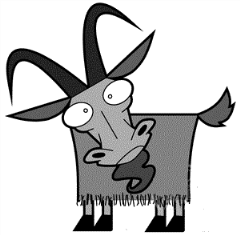| Maggie: | Da, Da, Da, Da... |
| Shuggie: | Whur’s tha fire, hen? |
| Maggie: | Da, Da, yoo ave goat t’come an see this. At’s sick. |
| Shuggie: | Whit? A goat’s bin sick? Whur? Who brought a goat intae tha hoose? Ah hope at’s no hurled all ower yer ma’s clean kitchen flair. |
| Maggie: | At’s no a goat. |
| Shuggie: | Whidyamean? Dinnae tell me tha dug’s puked his ring up. Whit’s e bin eatin? Af yoo bin feedin im Turkish Delight agin? |
| Maggie: | At’s no tha dug. |
| Shuggie: | Yer ma’s boked then? |
| Maggie: | Naw. |
| Shuggie: | Yoo? |
| Maggie: | Naebuddie’s sick. |
| Shuggie: | So whittre ye oan aboot? Yoo jist said summat wis sick. |
| Maggie: | This is sick. Cumman see. |
| Shuggie: | Ah dinnae wan t’see oaneybuddie’s sick. Cud they no find tha big white tellin’bone an gie Hughie a caw? |
| Maggie: | Da at’s no tha kinda sick. At’s tha guid kind. |
| Shuggie: | Whit’s guid aboot being sick, hen? Yer talkin pish. |
| Maggie: | Ah’m no. ‘Sick’ mean guid nooadays. |
| Shuggie: | Get awaw wi ye. Tha’s jist confusin. |
| Maggie: | Nae mair confusin than ‘hoat’ an ‘cool’ meanin guid. |
| Shuggie: | Hey, don yoo go moakin ma youff, hen. Noo whit ‘guid puke’ d’ye wan me t’see? |
| Maggie: | A noo refyoo af wan af Unca Jim’s books, tha first wan. |
| Shuggie: | As tha aw? |
| Maggie: | Aye, Da, but it’s a ... guid yin, a really guid yin. At’s hoat an cool an sick an slammin an perceptiff. |
| Shuggie: | Perceptiff, ye say? |
| Maggie: | Aye, Da, no messin aroon aythur. This gurl really get’s whur Unca Jim’s comin frae. |
| Shuggie: | Naw! |
| Maggie: | Aye. She yayses wurds like “psycho-philosophical study”, “Freudian” an “Harold Pinter”. |
| Shuggie: | She compairs oor Jim t’ Harold Pinter, tha goadfaither af tha dramaytic ... pause? Lassie, yoo are yankin ma chain. |
| Maggie: | No way, Da. Ah widne lay a finger oan yer chain. |
| Shuggie: | Okay, okay. Show us. Whit’s the gurl’s name? |
| Maggie: | Sorlil. Er site’s cawd Poemtry in Progress. |
| Shuggie: | Sorlil? Whit kinda name’s tha? |
| Maggie: | Ah dunno, Da. She’s frae Dunoon. |
| Shuggie: | Ah well, tha explains a loat. Thur’s nuhin t’dae thur but read. |
 Living with the Truth
Living with the Truth
 Stranger than Fiction
Stranger than Fiction
 This Is Not About What You Think
This Is Not About What You Think
 Milligan and Murphy
Milligan and Murphy
 Making Sense
Making Sense
Thursday 28 January 2010
Aggie and Shuggie 21
Monday 25 January 2010
The Mimic Men

Once a man is stripped of his dignities he is required, not to die or to run away, but to find his level. – V S Naipaul, Mr Stone and the Knights Companion
Trying to sum up The Mimic Men in a single word I find myself honing in on words like 'frustration', 'jealousy' and 'position' – these were the first three words that popped into my head – and I find that, when wrapped up into a single sentence, they actually make quite a bit of sense: this is a book about people who are jealous of the position others hold and are constantly frustrated in their efforts to completely move up the socio-economic ladder. I should explain 'completely': you can put a peasant in an Armani suit but that's all he'll ever be, a peasant in an Armani suit.
The narrator of our novel – his biography – is Ralph Singh, Ranjit Kirpalsingh actually (he changes his name while still at school), who, when we first meet him, is a disgraced colonial minister having been exiled from the fictitious Caribbean island of Isabella, a British dependency, a scapegoat following a nationalisation scandal. He is not penniless – he was permitted to leave the island with sixty-six pounds of luggage and $50,000, quite a bit in the mid-sixties, which is when this was written, but nothing compared to the fortune he amassed as a property magnate while still on Isabella before getting seduced by politics.
 He did not begin life poor but then neither was he rich. Singh's father had married above him into the Bella Bella Bottling family, agents for Coca Cola, but the real wealth never trickled down to him. A humble schoolteacher his father had advanced into the Ministry of Education and written a life of the local missionary. That was about his only claim to fame until later life when, in much the same way as his son stumbles into politics, he almost accidentally his becomes a cult leader to the poor and downtrodden, preaching a mix of Christianity and Hinduism. He also changes his name, to Gurudeva. Ironically, following this, his son's prestige amongst the pupils at school grows because the teachers mock him and then years later his father's reputation also proves a convenient stepping stone in Singh's political career. Apart from that he does his best to distance himself from his father's family and yet makes sure everyone is aware of his familial connect to Coca Cola:
He did not begin life poor but then neither was he rich. Singh's father had married above him into the Bella Bella Bottling family, agents for Coca Cola, but the real wealth never trickled down to him. A humble schoolteacher his father had advanced into the Ministry of Education and written a life of the local missionary. That was about his only claim to fame until later life when, in much the same way as his son stumbles into politics, he almost accidentally his becomes a cult leader to the poor and downtrodden, preaching a mix of Christianity and Hinduism. He also changes his name, to Gurudeva. Ironically, following this, his son's prestige amongst the pupils at school grows because the teachers mock him and then years later his father's reputation also proves a convenient stepping stone in Singh's political career. Apart from that he does his best to distance himself from his father's family and yet makes sure everyone is aware of his familial connect to Coca Cola:
I liked going with … groups to the bottling works, though it was a torment to me to be anonymous. I longed to receive some sign of overlordship or even recognition from the employees…
'Prestige', yes, that's a better word than 'position' and the one thing that everyone of Isabella is seeking. If it comes with money then all the better but a person's reputation is everything; the word crops up many times in the course of the novel. Right at the very end of the book, after having attained much and lost more, we witness this scene in the London boarding house masquerading as a private-hotel where he ends up living whilst writing his memoir. It is the communal Christmas meal:
I have moved up year by year, but I know I will never sit at our [land]lady's right hand. That position is reserved for a man who has been here twenty-three years, a shy, gentle, delicately-featured man, still quite young-looking, so unassertive in hall and bar and putting green that his eminence on the day comes as a surprise to many.
He acknowledges his own subordinate position but he's also not slow to point out how unworthy the man is as opposed to (although he doesn't say it explicitly) himself. Singh has no problem with a pecking order as long as he can look up to his superior. Early in the book he makes this observation about people on the island, while he was still in a position to command respect:
So we were set apart. And a little above. It is the human instinct for order; and those who willingly ranged themselves below us required us to display extraordinary qualities [and W]e were constantly challenged, provoked, tested.
In London Singh believes he has managed to hang onto his dignity but I'm not sure that's the right word; 'superiority' is a better one, a belief in his superiority at least.
This is not an especially religious novel. It crops up from time to time but Singh never comes across as a particularly spiritual man. It is noteworthy, however, to find that on the last two pages of the book he makes this observation about his life:
I no longer yearn for ideal landscapes and no longer wish to know the god of the city. This does not strike me as a loss. I feel, instead, I have lived through attachment and freed myself from one cycle of events. It gives me joy to find that in so doing I have also fulfilled the fourfold division of life prescribed by our Aryan ancestors. I have been student, householder and man of affairs, recluse.
He then considers what his options are. There are not so many. What he is sure is that:
I do not wish to be re-engaged in that cycle from which I have freed myself. I fear to be continually washed up on this city.
It's an interesting expression but the comparison of the two islands, Isabella and Great Britain, London standing as proxy for the whole country, is made more than once as is the metaphor of being shipwrecked. For example, when Singh suspects that his father's group has been responsible for the slaughter of a prize racehorse he describes what he sees as an ultimately pitiful and useless gesture as if being "performed by a shipwrecked man on a desert island." Likewise he refuses to identify with his family's history on the island; it is simply a place where they have been "shipwrecked". And, again, in London:
Shipwreck: I have used this word before. With my island background, it was the word that always came to me. And this was what I felt I had encountered again in the great city: this feeling of being adrift, a cell in preparation, little more, that might be altered, if only fleetingly, by any encounter.
Isabella is "a haphazard, disordered and mixed society." Singh is of Indian decent, his friend, Hok, has some Chinese in him, Deschampsneuf comes from one of the island's old French families and Browne, who eventually rises to leader of the new nationalist political party Singh becomes involved with, is black but all other shades get a mention throughout the book. Race has a great deal to do with identity but the problem with living in such a heterogeneous society is that there is no longer a clear indigenous population, plus, with the constant awareness that they have been colonised and are dependent on their colonial overseers, they mimic their masters in dress and attitudes but when the tourists arrive they mimic who they used to be. In an interview with Shankar Israel, Naipaul had this to say:
The people I saw were little people who were mimicking upper-class respectability. They had been slaves, and you can't write about that in the way that Tolstoy wrote about, even his backward society – for his society was whole and the one I knew was not. – Veena Singh, 'A Journey of Rejection: V S Naipaul's The Mimic Men' in ed, Mohit K Ray, V S Naipaul: Critical Essays, p156
Singh, of course, as "the late intruder, the picturesque Asiatic, [is] linked to neither" master nor slave; he has to carve out his own place.
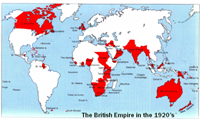 I grew up in the dying days of the British Empire. It's never really meant anything to me either as something to be proud about or embarrassed over. I certainly never viewed the British as conquerors, more like friendly chaps who wandered into countries and said, "Look, you're really not doing such a rum job running this place, why don't we take over for a while and show you how it should jolly well be done?" and who could refuse an offer like that? It's not until you read a book like this you realise to what extent colonisation can not just screw up a country's identity but also the lives of its youngest citizens.
I grew up in the dying days of the British Empire. It's never really meant anything to me either as something to be proud about or embarrassed over. I certainly never viewed the British as conquerors, more like friendly chaps who wandered into countries and said, "Look, you're really not doing such a rum job running this place, why don't we take over for a while and show you how it should jolly well be done?" and who could refuse an offer like that? It's not until you read a book like this you realise to what extent colonisation can not just screw up a country's identity but also the lives of its youngest citizens.
Singh and his friends have "all studied abroad and married abroad" and so, on returning to the island with his new busty bride, one can sense immediately a feeling that this is not home but it's all he's got; island life is more confining even than he felt himself trapped as a boy. That they would want to change things is understandable. And, like most politicians, I would like to believe, they begin with high ideals. Only once in power do they realise that there is power and real power. He believed that, unlike his father's movement which could only "disturb the peace," Browne and his supporters could, by virtue of their education "question the system itself" and they do but putting their plans into action proves harder than they might have expected. What they were promoting was nothing new; it was happening "in twenty places, twenty countries, islands, colonies, territories" around the world – "the pace of postwar political change" is well documented – but they were relying on "borrowed phrases" from other revolutions in other places. Ultimately he recognises:
We began in bluff. We continued in bluff. But there was a difference. We began in innocence, believing in the virtue of the smell of sweat. We continued with knowledge, of poverty and power.
The people may have been behind them but foreign businesses and colonial officials weren't; they simply didn’t have the money they needed to bring their plans to fruition which ultimately is why his father's cult failed because charitable donations dried up. Singh is sent, cap in hand, looking for government aid from London:
It was a brief, humiliating meeting. This man, whom in other, humbler capacities I had met more than once before on various government trips to London and had thought affable and slightly foolish, now barely had time for the courtesies. His manner indicated clearly that our game had gone on long enough and he had other things to do than to assist the public relations of colonial politicians. In about forty-five seconds he painted so lively a picture of the consequences of any intemperate action by the government of Isabella that I felt personally rebuked.
Then I spoke the sentence which tormented me almost as soon as I had said it. It was this which no doubt made the interview so painful in recollection. I said, 'How can I take this message back to my people?' 'My people': for that I deserved all I got. He said: 'You can take back to your people any message you like.' And that was the end.
He returns to Isabella but only briefly. No one wants anything to do with him bar his family. Within weeks the government falls and so when an opportunity to escape is provided by the "new leaders" he jumps at it.
A striking amount of this book is devoted to Singh's childhood and the effect that the overpowering need to improve ones status had on him, his friends and family, His political career takes up only a fifth of the whole book and so in this regard I think of this book as more of a psychological study than a political study despite the fact that who he is is a direct result of the effects of British colonialism. I've already mentioned the fact that he thinks of himself as shipwrecked on Isabella. If that's the case then where is he truly from?
I have read that it was a saying of an ancient Greek that the first requirement for happiness was to be born in a famous city.
He imagines London but his student days tell him otherwise. This is a great disappointment of course. His suits may or may not have been Armani – Naipaul never says – but all people see is the man inside the suit. It's no wonder that on his return to the island he seeks a way to change Isabella since he clearly cannot escape it.
Singh is a hard man to like. As a boy much can be excused but the man is what the boy grew into and so it's understandable that Naipaul would spend a lot of time looking at Singh's upbringing. He is not close to anyone, not his friends or his family. That in the end he should be abandoned with such ease is no great surprise. While still at school he deliberately sets out to "eliminate and simplify" his relationships concentrating "on school and relationships within that private hemisphere" but what he does discover is that many were willing to take him for what he said he was; he calls this, strangely enough, "a revelation of wholeness" but he's imagining it because he wants/needs it. He refuses though to attend the farewell dinner his school friends plan for him due to an impulsive "fear of warmth and friendship".
His relationships with women are primarily sexual. He seeks comfort in the arms of prostitutes and one has to question seriously his motives for marrying his wife, Sandra; without a doubt her Englishness is a major contributory factor as is the size of her bosom – that Naipaul has given Singh a breast fetish should not be skipped over lightly. Towards the end of the book Singh has a brief affair with Lady Stella while he still has some reputation left. He describes her manner as "a way of looking at the city and being in it, a way of appearing to manage it and organize it for a series of separate, perfect pleasures … It was a creation, of the city I had once sought; an unexpected fulfilment." Tell me if I'm wrong but has he finally managed to have sex with the personification of London itself or am I reading too much into this? It's not exactly a passionate affair; she's not really his type having disappointingly small breasts, and, once his failure becomes absolute, it's clear that he's not her type either.
I started off looking for a word to describe this novel. Here's another I've just thought of: 'ponderous'. The word has various meanings:
pon·der·ous
Function: adjective
Etymology: Middle English, from Anglo-French ponderus, from Latin ponderosus, from ponder-, pondus weight
Date: 15th century
1 : of very great weight
2 : unwieldy or clumsy because of weight and size
3 : oppressively or unpleasantly dull : lifeless <ponderous prose>
but it also connotes something to ponder, to weigh in the mind, to think upon. The Mimic Men is not an especially heavy book, a mere 251 pages in the Penguin edition although the print was fairly densely packed compared to more recent printings. So it feels like you're reading a lot and it took me a while to wade my way through this book; it is not light reading. To say it is 'dull' is to be a bit harsh but if truth be told Ralph Singh is a fairly dull character. Even when he's describing exciting things he manages to drain the colour out of the moment. The review in The Times back in 1967 noted this too.
As it is, while Singh (or Naipaul) ponders on meanings, we wait in vain for the novel to happen. These recollected events fail to shatter the even tenor of the memoirist's voice and the over-controlled surface, to burst into fiction, to validate Singh's withdrawal. Failing that, his solemnity is diminished to attitudinizing, by hollow literary posturing. He himself speaks of himself as a "dandy," and he is right; but that is not what he meant.
We're all the more disappointed because we keep thinking what a novel this could have been. Naipaul writes wonderfully well. He has been myopically neglected in this country. Sentence for sentence, he is a model of literary tact and precision, and his imagination--despite any criticism that can be levelled against this book--is nothing but a novelist's. Even his failure is a caution to spurious successes. – Saul Malloff, 'Yesterday in Isabella', The Times, October 15, 1967

***
Vidiadhar Surajprasad Naipaul (born August 17, 1932 in Trinidad and Tobago) is a British writer descended from Hindu Indians who had immigrated to Trinidad as indentured servants. He was educated at the University of Oxford in England.
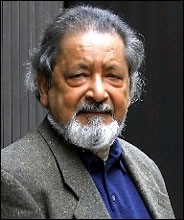 Naipaul’s personal life is shocking – he frequently cheated on his first wife with prostitutes, ill-treated her (to the extent that he admitted his devotion to his writing and infidelities may have accelerated her death) and welcomed another woman into his house the day after her funeral. Paul Theroux wrote a damning book about him and in a newspaper article thinks he didn't go nearly as far as he should considering Naipaul nothing less than a "monster". Referring to a more recent biography he had this to say:
Naipaul’s personal life is shocking – he frequently cheated on his first wife with prostitutes, ill-treated her (to the extent that he admitted his devotion to his writing and infidelities may have accelerated her death) and welcomed another woman into his house the day after her funeral. Paul Theroux wrote a damning book about him and in a newspaper article thinks he didn't go nearly as far as he should considering Naipaul nothing less than a "monster". Referring to a more recent biography he had this to say:
It is not a pretty story; it will probably destroy Naipaul’s reputation for ever, this chronicle of his pretensions, his whoremongering, his treatment of a sad, sick wife and disposable mistress, his evasions, his meanness, his cruelty amounting to sadism, his race baiting. Then there is the “gruesome sex”, the blame shifting, the paranoia, the disloyalty, the nasty cracks and the whining, the ingratitude, the mood swings, the unloving and destructive personality. – The Times, April 6, 2008
The biographical elements of The Mimic Men start to become disturbingly clear.
Despite all of this Naipaul has won numerous honours and awards including the Booker prize and a knighthood. In awarding Naipaul the Nobel Prize for literature in 2001, the Swedish Academy called him a "literary circumnavigator" and a "modern philosophe."
Thursday 21 January 2010
What did you find today?
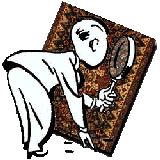 Is poetry an invention or a discovery? Forms are certainly inventions – the lesser-spotted sonnet doesn't exist in nature – but poetry is natural. It is directly connected to nature, with or without a capital N. Now although it's true that I construct a poem, I do so out of pre-existing things and ideas. I rarely make up new words (although certainly some poets do and there's nothing wrong with that) and so I'm using concepts and definitions that we are all familiar with, not simply to say what's already been said. but to probe a little further into those all too familiar words to see what else might be there. I rarely set out with a map, although sometimes I do have some inkling where a new thought might lie; usually I just trip over them in the dark.
Is poetry an invention or a discovery? Forms are certainly inventions – the lesser-spotted sonnet doesn't exist in nature – but poetry is natural. It is directly connected to nature, with or without a capital N. Now although it's true that I construct a poem, I do so out of pre-existing things and ideas. I rarely make up new words (although certainly some poets do and there's nothing wrong with that) and so I'm using concepts and definitions that we are all familiar with, not simply to say what's already been said. but to probe a little further into those all too familiar words to see what else might be there. I rarely set out with a map, although sometimes I do have some inkling where a new thought might lie; usually I just trip over them in the dark.
Poetry can be found in the strangest of places. Most poets are content to pick at the flotsam and jetsam that float past us; others get out their poetry-detectors and take a more proactive approach.
Found. What does it mean? I know you know what it means, it's another one of those words we use all the time without thinking about it. We find pennies on the street, we find our glasses by the sink where we took them off, we find true love down the back of the couch. Something what's found usually has been lost but not always: in the first instance someone else lost the coins, in the second it was us that misplaced our glasses and in the third example, well, no one lost true love and yet it can still be found.
Some, of course, believe that the poetry finds us but I don't buy that. I don't believe in muses as conscious entities.
So what's a 'found poem' when it's at home? Really it's none of the above. The words have not been lost, they have been deliberately laid out by their original author and specific meaning ascribed to them. Then what happens is a poet comes along, misappropriates the words and forces new meaning into them. The word Wikipedia uses is reframes and that makes sense to me. I can cut a photo of some actress out of a magazine and stick it in a frame but is that art? If I drew a moustache and a wee goatee on her could I then say that it's art? That's exactly what Marcel 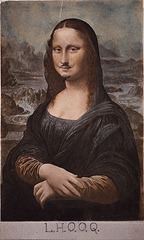 Duchamp did with L.H.O.O.Q. – he found – now whether that is active finding or passive finding I don't know – a cheap postcard reproduction of the Mona Lisa, drew a moustache and beard in pencil and appended the title.
Duchamp did with L.H.O.O.Q. – he found – now whether that is active finding or passive finding I don't know – a cheap postcard reproduction of the Mona Lisa, drew a moustache and beard in pencil and appended the title.
Now, love it or loathe it, no one can say that L.H.O.O.Q. doesn't make you think and many have. It's one of a host of readymades that he presented to the world as art from 1915 on. The concept behind them is simple enough. Duchamp says that anything can be turned into art simply by an artist interacting with it which is why Tracey Emin's My Bed is art because she says it is. The debate rages on there too.
I'm just not sure about found poetry which is the poetic equivalent of the readymade. Would this be a found poem?
Neither Red nor White
nothing depends
upon
a blue wheelbarrow
glazed with rain
water
beside the brown
chickens.
I've done exactly what Duchamp did, taken a familiar piece, fiddled with it, given it a cryptic title and there you have it. I mean, anyone could be a great poet doing this.
Wikipedia gives as good a definition of 'found poetry' as any I've read before:
Found poetry is a type of poetry created by taking words, phrases, and sometimes whole passages from other sources and reframing them as poetry by making changes in spacing and/or lines (and consequently meaning), or by altering the text by additions and/or deletions. The resulting poem can be defined as either treated: changed in a profound and systematic manner; or untreated: virtually unchanged from the order, syntax and meaning of the original.
So how about?
Thanksgiving
so much depends
upon
a small white
turkey
shivering
under
the red wheel
barrow.
A good example of found poetry taken a bit more seriously can be found at Slate. In this article they've taken things that Secretary of Defence Donald Rumsfeld has said and presented them as poetry, for example:
A Confession
Once in a while,
I'm standing here, doing something.
And I think,
"What in the world am I doing here?"
It's a big surprise.—May 16, 2001, interview with the New York Times
The transcript of the interview is here but to save you having to dig through it here's the Q & A it was taken from:
Q: How big is your place?
Rumsfeld: A donkey named Bo and a mule named (inaudible). My wife had just bought some horses. We had some quarter horses, but she bought some Missouri fox trotters which have a smoother gait and she had just said to me that this was going to be our rural period. (Laughter) All of a sudden, here we are. It's amazing.
Once in awhile I'm standing here doing something and I think what in the world am I doing here? It's a big surprise.
Now, it's helpful to have the reference for the sake of this article but where would the world stand if that poem had appeared on its own without any reference to where it originated? When I put up poems in my articles I quite often tell you a bit about the origin of the work but in a magazine there's nothing, all you get is the poem and that's that. Take this poem:
Paper Cuts
Today I found a
poem in a bookwritten with scissors,
words literally
cut out of each page.
It gave the poem
a new dimension:
sliced wide open and
gutted of meaning
the text was waiting
to be fulfilled.
Tuesday, 08 April 2008
Are those words mine or did I get them from someone else? I would argue that they're mine although some of them I found in someone else's text.
Here's the 'found poem' as it stood originally:
Power Cuts

Yesterday I found
a text in a book
written with scissors
the words literally
cut out of the page.
It gave the language
another dimension
beginning with thought
but closest to poetry.
This was a poem I 'found' in a text on found poetry posted here. Below you can see the words I extracted.
Poetry, whose material is language, is perhaps the most human and least worldly of the arts, the one in which the end product remains closest to the thought that inspired it. Hannah Arendt
Yesterday I mentioned working with found poetry or using snippets of text from one or many sources arranged into a poem. Jim's comment about giving a few more examples inspired this post. Thanks Jim! P.S. Jim's blog today has a great post on confident writing and a link to his guest post on power.
I found this informative article on found poetry by Katie Haegele. And then an example of one of her found poems. She used a section of a vintage Boy Scouts manual to form a poem. For me the idea of found poetry or found text poetry is to see poetry everywhere and to play with words and language. Enjoy words. You can photocopy a section from a book and literally cut and paste your words onto a new document. For many beginning poets this lessens some of the fear associated with
writing an original work. Many altered art artists use found text or found poetry to add another dimension to their art work.Today, think about how play can add to your creative body of work. Take something you've written and photocopy it. Add scissors and paste. Cut out words or phrases. Arrange text. Don't worry about the right way or the wrong way. PLAY. Now get back to work!
I found the poem but not in the same way that the writer of the Rumsfield poem found the poem. The thing restricted me to the words in the text and forced the meaning of my poem in a certain direction. I think the result is an okay poem but I also think that when I used it as a source of inspiration the resultant poem is better.
If we look at the first version of 'Power Cuts' what I have to admit is that I didn't so much write the poem as arrange it. What turns a bunch of flowers into a bouquet? I could have written it, none of the words were unknown to me and no one owns them, and in that respect all my poetry is found and arranged because that's what I do, I look for words to fiddle with. All day long words, phrases, sentences flit through my head, things my wife says, things off the TV. In my first novel there's a whole sentence that Captain Kirk said but God alone knows where it is in the book or even if it remained unrevised in the final print. Besides the line's mine now – finder's keepers – and so why should I credit him?
 All our words are borrowed. Every poem I will ever write is already in my head. All I have to do is locate the words. Marshall McLuhan said that "The poet dislocates language into meaning." Like all attempts to define poetry it falls short but not completely, not at its basic level, i.e. poetry = words arranged on a page. I know that prose is arranged into sentences and paragraphs but the arrangement of the words has always been of much greater importance to the poet. As Jacques Ehrmann puts it, "Poetic language is not another language, it is the same language." There is poetry to be found in prose text just as there is prose to be found in poetry. It all depends what you're looking for what you'll find. Take this for example:
All our words are borrowed. Every poem I will ever write is already in my head. All I have to do is locate the words. Marshall McLuhan said that "The poet dislocates language into meaning." Like all attempts to define poetry it falls short but not completely, not at its basic level, i.e. poetry = words arranged on a page. I know that prose is arranged into sentences and paragraphs but the arrangement of the words has always been of much greater importance to the poet. As Jacques Ehrmann puts it, "Poetic language is not another language, it is the same language." There is poetry to be found in prose text just as there is prose to be found in poetry. It all depends what you're looking for what you'll find. Take this for example:
Every thing has its history. It is all but impossible to be without acquiring one. Indeed one possible definition of 'existence' might be 'a talent for amassing histories'. Things drag their histories along with them. Some attract such detailed histories that they completely bury the things themselves. They form a hard crust around them so that the things' true meanings shrivel up and die. And all we're left with is an empty shell.
Is this a passage of prose or a poem that's been formatted as prose? I'm not going to tell you. The thing is most people are okay about 'dislocating' a poem from a block of text but does it work the other way round? Or does that somehow feel wrong?
So much depends upon a red wheelbarrow glazed with rain water beside the white chickens.
Did I do a bad thing? Has it stopped being poetry? If you didn't know it had been a poem would you think to extract it from this article, give it a title and send it out into the big bad world as . . . okay, maybe not one of your own but perhaps an adopted poem?
There is another thing here. 'The Red Wheelbarrow' is still in copyright as is the paragraph above, the extract from The Writing Nag's site, the quote from the New York Times and this sentence that I'm writing right now. I own these words, these words I'm typing now and you can't use any of them without asking me first. Now we're just getting silly.
I used to know a woman whose son 'found' things. "Where did you get that from, son?" "Oh, this? I found it, mum." You have no idea how long it took for it to dawn on her that he was stealing stuff.
So I'm really not sure where I stand on the whole 'finding poems' thing. At the end of the day they're just words and no one owns any of them (apart from me who owns all the words on this page) so where do you draw the line and do you really need to reveal your source? To my mind that goes against the whole notion of a poem standing of falling on its own merit. By directing people to the source material all I'm doing is saying: "Hey, look at me! Aren't I clever for being able to get a poem out of all of this?" And that's not really me.
Nowadays people use machines to help them find things, for example the humble metal detector. What about using a machine to find poetry? No, it's not as daft as it sounds. 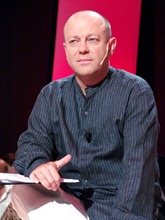 Andrei Gheorghe, a Romanian web developer has done just that. He's created "The Longest Poem in the World", composed by aggregating real-time public Twitter updates and selecting those that rhyme. At time of writing this (13th December) he was up to 750,706 verses but you can check his progress to date here. It rhymes so it must be a poem. Right? But it doesn’t make any sense. Now that's me harping on about meaning again. But, tell me the truth, all those out there who truly believe that the primary function of a poem is not to mean something, where's this thing going other than into a) a bin and/or b) the record books?
Andrei Gheorghe, a Romanian web developer has done just that. He's created "The Longest Poem in the World", composed by aggregating real-time public Twitter updates and selecting those that rhyme. At time of writing this (13th December) he was up to 750,706 verses but you can check his progress to date here. It rhymes so it must be a poem. Right? But it doesn’t make any sense. Now that's me harping on about meaning again. But, tell me the truth, all those out there who truly believe that the primary function of a poem is not to mean something, where's this thing going other than into a) a bin and/or b) the record books?
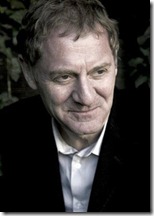 Recently Andrew Motion caused a bit of a kerfuffle when he published a 'found poem' for Remembrance Day, which, to quote The Guardian, "stitches together the words of several generations of shell-shocked soldiers from the first world war to the present." There was even a fragment of Siegfried Sassoon in there! Now rather than praising the ex-poet laureate for embracing this new-fangled form of poetry he got accused of plagiarism by military historian Ben Shephard. Shephard said that Motion's poem draws heavily from his history of medical psychiatry A War of Nerves:
Recently Andrew Motion caused a bit of a kerfuffle when he published a 'found poem' for Remembrance Day, which, to quote The Guardian, "stitches together the words of several generations of shell-shocked soldiers from the first world war to the present." There was even a fragment of Siegfried Sassoon in there! Now rather than praising the ex-poet laureate for embracing this new-fangled form of poetry he got accused of plagiarism by military historian Ben Shephard. Shephard said that Motion's poem draws heavily from his history of medical psychiatry A War of Nerves:
Of the 152 lines in An Equal Voice, all but 16 are taken directly from A War of Nerves. Only in two places has Motion quoted my own words: in all the other cases, they are those of soldiers and doctors. So, in terms of copyright, he's clean as a whistle. Morally, it's another story. Motion has added nothing new or original to this subject. There is a word for this. It begins with 'p' and it isn't 'poetry'.
Motion defends himself in an article in The Guardian saying that:
…his poem drew on "a long and honourable tradition" of "found" poetry, pointing to TS Eliot's 'The Waste Land', Ruth Padel's poetic biography of Charles Darwin and Anthony Thwaite's Victorian Voices. "It goes right back to Shakespeare," he said. "It's very well established."
[…]
"I wanted it not to be about me – it's their poem ... Quite a lot of my annoyance is precisely to do with the distortion of that," he added. "The reason I feel so robust about this is that if I felt I had done anything at all underhand, I would be sitting here with a hot conscience, but that's absolutely not the case. I was absolutely clear about what was involved in the process. I'm very sorry he doesn't like it, but as far as I'm concerned I feel OK about it."
Like most thing I can see both points of view. But it's nice to see a high profile examination of the issue. Really the role that Motion has taken on here is slightly different from the one you would normally associate with a poet. Nick Piombino explains this difference when he writes in his essay 'The Aural Ellipsis and the Nature of Listening in Contemporary Poetry':
While at one time the poet's central role was to declaim his or her beliefs, experiences, wisdom, and ideas eloquently or adamantly through lyrics and narrations in a kind of public speech or song-making, for many poets these notions of a poet's essential role are no longer completely apt. Frequently, the poet seems to view his or her expressive function more as a medium or a "conduit" as Barrett Watten has phrased it. The poet is a researcher who must listen closely to the sounds and voices of actuality to discover where the poetry may exist within it.
I think the key word here is "conduit" and I'm sure it’s one that many poets will relate to, a feeling of being the middleman, just the guy or gal whose job it is to write the poem down; that it's not theirs. I've felt like that in the past but not any more.
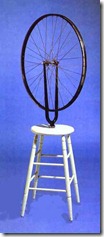 I prefer to think about what I do as an 'assisted readymade' to go back to Duchamp. The best known example of that is probably his Bicycle Wheel. There's a lot of me in my poems but it's not all me, never all me and sometimes not nearly as much me as you might imagine. Pound said, "Make it new," and that's what I try to do but really I have more in common with Marianne Moore than producers of pure found poetry. In an article on East of Mina, Rebecca has this to say:
I prefer to think about what I do as an 'assisted readymade' to go back to Duchamp. The best known example of that is probably his Bicycle Wheel. There's a lot of me in my poems but it's not all me, never all me and sometimes not nearly as much me as you might imagine. Pound said, "Make it new," and that's what I try to do but really I have more in common with Marianne Moore than producers of pure found poetry. In an article on East of Mina, Rebecca has this to say:
Marianne Moore … quotes everything from Shakespeare to National Geographic (and unlike Eliot, carefully notes all their original homes in the back of her collection). Some of her poems (“Marriage” for instance) seem to merely be the notes from a lifetime of avid reading cut up and pasted together. And, although intentionality and commentary emerge with deeper attention, her poetry foreshadows the found poem: a poem patched together from bits of language discovered in other places. – italics mine
I wonder how many of us have written a poem and then a few weeks later pick up some old book and lo and behold there's our poem only written by, and probably written better by, someone else? There is nothing new under the sun. Everything 'found' was 'lost' by someone else somewhere along the line. Poetry is pure recycling.
Further reading
Redeeming Prose: Colombo's Found Poetry
Gumshoe Poetry / Poetry of Detection
Found poetry: what can it do for you?
There are a few sites devoted to this form of poetry, for example, The Found Poetry Project and Found Poetry.
Monday 18 January 2010
The Paris Review Interviews Vol. 4
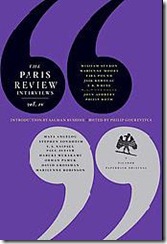 I have interviewed and I have been interviewed. No, that's incorrect. I've been questioned and I've asked questions. There is a difference. On the surface, of course, an interview is simply a list of questions and answers, whats and wheres and how-did-yous, but a Q&A is not an interview. They're hard to pull off and I don’t think I’ve mastered the art yet. Sometimes it's the fault of the interviewer, sometimes it's the interviewee.
I have interviewed and I have been interviewed. No, that's incorrect. I've been questioned and I've asked questions. There is a difference. On the surface, of course, an interview is simply a list of questions and answers, whats and wheres and how-did-yous, but a Q&A is not an interview. They're hard to pull off and I don’t think I’ve mastered the art yet. Sometimes it's the fault of the interviewer, sometimes it's the interviewee.
The Paris Interviews Vol. 4 is a mixed bag. As with the previous collections it spans decades. Some writers are at the beginnings of their careers, others are into the final verse of their swansongs. Ezra Pound was well enough to complete his interview over three days but proved too poorly to finish proofreading it. Who knows what he might have changed or added. Perhaps it's the better without the rough edges trimmed, more like the man himself (we'll never know) whereas Marianne Moore saw fit to correct herself in a footnote, a minor faux pas which I certainly would never have caught but it's nice to get things right.
There are poets in this collection, novelists, an essayist (E. B. White) and even a songwriter if you can call Stephen Sondheim merely a songwriter; no playwrights though although I'm sure one or two of them will have had a crack at a play.
Apart from crisscrossing the various literary forms the interviewees are from all over the globe although this is edition is top-heavy on Americans. Even the one Briton has lived in America for years:
- America: William Styron, Marianne Moore, Ezra Pound, Jack Kerouac, E. B. White, John Ashbery, Philip Roth, Maya Angelou, Stephen Sondheim, Marilynne Robinson
- United Kingdom: P. G. Wodehouse
- Trinidad: V. S. Naipaul
- Japan: Haruki Murakami
- Turkey: Orhan Pamuk
- Israel: David Grossman
So, when faced with a roster like that who would you pick to read first? For me it was a no-brainer: Wodehouse; not because he was the only Brit, but because I wanted to start off with someone who was effusive and enthusiastic about what he did and had been doing for seventy-odd years. I haven't done the sums but I'm sure Pound could have given him a run for his money but I also knew what to expect from Pound and I didn't feel like bombastics. These two were the oldest writers interviewed and both indeed passed away not long afterwards. Marilynne Robinson is the baby of the bunch. Although born in 1943 her first novel was only published in 1980.
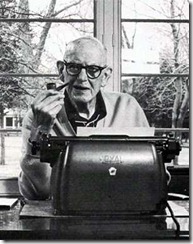 One thinks of Wodehouse as quintessentially English so it surprised me to find that he had lived in America albeit "on twelve acres in Remsenburg, a pretty, quiet little town in eastern Long Island" for a great many years. There was much to make me smile here. Whereas many of the other authors in the volume are intense, there's none of that here, but there is passion undoubtedly. No, 'passion' is not right – 'delight', that's the word. I'm not an optimist – far from it – and so when I find watching and listening to them endlessly fascinating: how can people be like that? Here's the opening of the interview:
One thinks of Wodehouse as quintessentially English so it surprised me to find that he had lived in America albeit "on twelve acres in Remsenburg, a pretty, quiet little town in eastern Long Island" for a great many years. There was much to make me smile here. Whereas many of the other authors in the volume are intense, there's none of that here, but there is passion undoubtedly. No, 'passion' is not right – 'delight', that's the word. I'm not an optimist – far from it – and so when I find watching and listening to them endlessly fascinating: how can people be like that? Here's the opening of the interview:
INTERVIEWER
You're ninety-one now, aren't you?
WODEHOUSE
Ninety-one and a half! Ninety-two in October.
INTERVIEWER
You don't have any trouble reading now, do you?
WODEHOUSE
Oh, no!
INTERVIEWER
How about writing?
WODEHOUSE
Oh, as far as the brain goes, I'm fine. I've just finished another novel, in fact. I've got a wonderful title for it, Bachelors Anonymous. Don't you think that's good? Yes, everybody likes that title. Peter Schwed, my editor at Simon and Schuster, nearly always alters my titles, but he raved over that one. I think the book is so much better than my usual stuff that I don't know how I can top it. It really is funny. It's worked out awfully well. I'm rather worried about the next one. It will be a letdown almost. I don't want to be like Bernard Shaw. He turned out some awfully bad stuff in his nineties. He said he knew the stuff was bad but he couldn't stop writing.
Yes, of course he's talking about Shaw but he's also talking about himself. He could also be talking about most of the writers represented here.
The one that for some reason surprised me was Kerouac. I 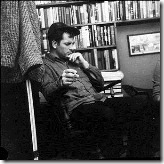 doubt Wodehouse and Kerouac are often mentioned in the same sentence but they have one thing in common, their effervescence. Both literally bubble over with the joy of writing. Kerouac even writes a poem there and then in the middle of the interview:
doubt Wodehouse and Kerouac are often mentioned in the same sentence but they have one thing in common, their effervescence. Both literally bubble over with the joy of writing. Kerouac even writes a poem there and then in the middle of the interview:
INTERVIEWER
How do you write haiku?
KEROUAC
Haiku? You want to hear haiku? You see you got to compress into three short lines a great big story. First you start with a haiku situation – so you see a leaf, as I told her the other night, falling on the back of a sparrow during a great big October wind storm. A big leaf falls on the back of a sparrow. How are you going to compress that into three lines? Now in Japanese you got to compress it into seventeen syllables. We don’t have to do that in American – or English – because we don’t have the same syllabic bullshit that your Japanese language has. So you say: "Little sparrow" – you don't have to say little – everybody knows a sparrow is little because they fall so you say:
Sparrow
with big leaf on its back –
windstorm
No good, don't work, I reject it.
A little sparrow
when an autumn leaf suddenly sticks to its back
from the wind.
Hah, that does it. No, it's a bit too long. See? It's already a bit too long, Berrigan, you know what I mean?
INTERVIEWER
Seems like there's an extra word or something, like when. How about leaving out when? Say:
A sparrow
an autumn leaf suddenly sticks to its back –
from the wind!
KEROUAC
Hey, that’s all right. I think when was the extra word. You got the right idea there, O'Hara! "A sparrow, an autumn leaf suddenly" – we don't have to say suddenly do we?
A sparrow
an autumn leaf sticks to its back –
from the wind!
[Kerouac writes final version into a spiral notebook.]
Okay, so it's not great poetry but it may become great later. I say 'later' because earlier in the interview Kerouac admitted:
[H]aiku is best reworked and revised. I know, I tried. It has to be completely economical, no foliage and flowers and language rhythm, it has to be a simple little picture in three lines. At least that's the way the old masters did it, spending months on three little lines…
After the formal interview had been completed Kerouac said to the two interviewers:
So, you boys are poets, hey? Well, let's hear some of your poetry.
and they ended up spending another hour with him reading their own stuff which was nice, I thought.
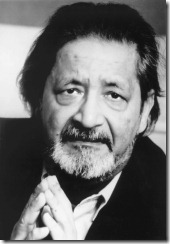 I can't imagine V. S. Naipaul being like that. In his introduction the interviewer remarked that he "can be a difficult companion" and yet, despite his "edginess … the slight air of unpredictability" and the fact that the man's "neurotic circuitry is still buzzing" he conceded, much to my surprise knowing what I know about him, that "Naipaul proved to be an interviewer's delight." The bottom line is that Naipaul does not suffer fools gladly and several times throughout the interview which was "culled from a series of conversations in New York and India" you often see him saying things like this to his interviewer:
I can't imagine V. S. Naipaul being like that. In his introduction the interviewer remarked that he "can be a difficult companion" and yet, despite his "edginess … the slight air of unpredictability" and the fact that the man's "neurotic circuitry is still buzzing" he conceded, much to my surprise knowing what I know about him, that "Naipaul proved to be an interviewer's delight." The bottom line is that Naipaul does not suffer fools gladly and several times throughout the interview which was "culled from a series of conversations in New York and India" you often see him saying things like this to his interviewer:
Try it again. Rephrase it. Make it simple and concrete so we can deal with it.
or
Be concrete. Where am I rough? Where have you found me harsh? Give me an example.
I had expected Pound to come across much the same way so I didn't rush to read his interview but I was pleasantly pleased by what I found there. He is direct and does not pussyfoot around the issues but I was particularity impressed by his answer to this question:
INTERVIEWER
You have given advice to the young all your life. Do you have anything special to say to them now?
POUND
To improve their curiosity and not to fake. But that is not enough. The mere registering of bellyache and the mere dumping of the ashcan is not enough. In fact the University of Pennsylvania student Punchbowl used to have as its motto, "Any damn fool can be spontaneous."
and in another part of the interview when asked what the greatest quality a poet can have:
I don’t know that you can put the needed qualities in hierarchical order, but he must have a continuous curiosity, which of course does not make him a writer, but if he hasn’t got that he will wither.
Having beaten my head against his Cantos as a young man I was pleased to hear him admit though that "the writing is too obscure as it stands" – and here I thought I was just thick.
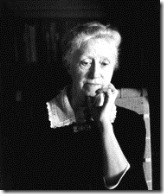 I found myself working through the poets first of all, after Wodehouse that is. Some I knew better than others but probably the one I enjoyed the most was Marianne Moore. The interviewer says that "Miss Moore spoke with an accustomed scrupulosity, and with a humour that her readers will recognise." What a lovely word – scrupulosity – and so apt too. I had seen an interview with her recently – the first time I'd ever heard her speak – and so I suspect that's why this particular interview came so alive to me. I was particularly struck by this admission:
I found myself working through the poets first of all, after Wodehouse that is. Some I knew better than others but probably the one I enjoyed the most was Marianne Moore. The interviewer says that "Miss Moore spoke with an accustomed scrupulosity, and with a humour that her readers will recognise." What a lovely word – scrupulosity – and so apt too. I had seen an interview with her recently – the first time I'd ever heard her speak – and so I suspect that's why this particular interview came so alive to me. I was particularly struck by this admission:
I disliked the term "poetry" for any but Chaucer's or Shakespeare's or Dante's. I do not now feel my original hostility to the word, since it is a convenient, almost unavoidable term for the thing (although hardly for me – my observations, experiments in rhythm, or exercises in composition). What I write, as I have said before, could only be called poetry because there is no other category in which to put it.
[...]
It never occurred to me that what I wrote was something to define. I am governed by the pull of the sentence as the pull of a fabric is governed by gravity.
Very striking. She never set out to be a poet. Painting was the top of her artistic interests. In fact she says:
I have a passion for rhythm and accent and so I blundered into versifying.
Ashbery was exactly the same:
I had tried painting earlier, but I found that poetry was easier than painting.
I had a similar experience. With me it was between painting, composing and writing and, for much the same reason, writing won out. I was interested too by a similar remark he makes to Moore's above in answer to this question:
INTERVIEWER
When you say that sometimes you think your poetry is weird, what do you mean exactly?
ASHBERY
Every once in a while I will pick up a page and it has something, but what is it? It seems so unlike what poetry "as we know it" is. But at other moments I feel very much at home with it. It's a question of a sudden feeling of unsureness at what I'm doing, wondering why I am writing the way I am, and also not feeling the urge to write in another way.
Before I move away from the poets I’d like to highlight a couple of things that Ashbery said when asked what determines a line break for him. He talks about a couple of examples and then admits:
[A]lthough the line break is very important to me, I don’t really understand how I know when it is supposed to happen.
[...]
When I was in college, I used to write a kind of four-beat line, which seemed much more real, genuine, to me [than iambic pentameters]. Now I guess it is free verse, whatever that is.
It came as no great surprise when a couple of pages later he is asked for the “indispensable element” that makes something into poetry he says it’s one of those “good but unanswerable questions.” Of course I have to agree with him, you can’t define poetry in a sound bite and once you start listing all the things that can and can’t be poetry the resultant document is closer to legalese than anything else.
 You kind of expect a writer who’s been at it for years, and with some success, to know what they’re doing and to be able to explain what they’re doing in words, the tools of their trade. If the poets had a hard time explaining how they went about their business the prosers don’t fare much better. Paul Auster (who “died as a poet” but was “reborn as a novelist”) freely admits:
You kind of expect a writer who’s been at it for years, and with some success, to know what they’re doing and to be able to explain what they’re doing in words, the tools of their trade. If the poets had a hard time explaining how they went about their business the prosers don’t fare much better. Paul Auster (who “died as a poet” but was “reborn as a novelist”) freely admits:
No book I've ever published has ever turned out as I thought it would. Characters and episodes disappear; other characters and episodes develop as I go along. You find the book in the process of doing it. [italics mine]
He then illustrates this finding process by talking about how his novel Mr. Vertigo “seemed to acquire a life of its own” and grew from the short story he thought he was writing into a full-blown novel:
Writing has always been like that for me. Slowly blundering my way toward consciousness.
Another blunderer! That “blundering”, for Auster at least, takes place one paragraph at a time:
The paragraph seems to be my natural unit of composition. The line is the unit of a poem, the paragraph serves the same function in prose – at least for me. I keep working on a paragraph until I feel reasonably satisfied with it, writing and rewriting until it has the right shape, the right balance, the right music – until it seems transparent and effortless, no longer “written”. That paragraph can take a day to complete or half a day, or an hour, or three days.
I can empathise with Auster quite a bit actually having written only poetry for twenty years before finding myself expressing my thoughts in prose. With me it was three years, with Auster a year, of “wallowing in the doldrums” before picking up a pen and finding that “the words came out as prose” but I agree emphatically with his reasoning because it was exactly how I felt at the time:
The only thing that mattered was saying the thing that needed to be said. Without regard to preestablished conventions, without worrying about what it sounded like.
In his case it was actually a work of nonfiction, The Invention of Solitude, before moving onto the work he is probably best known for, The New York Trilogy.
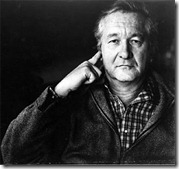 In interviews of this nature it’s inevitable that there will be a number of questions that even the most inventive interviewer will be hard-pressed to avoid, questions like: Do you enjoy writing? or Does writing come easily to you? Young or old the answers are much the same. In answer to the first question, William Styron, a writer I’m unfamiliar with, answered forcibly:
In interviews of this nature it’s inevitable that there will be a number of questions that even the most inventive interviewer will be hard-pressed to avoid, questions like: Do you enjoy writing? or Does writing come easily to you? Young or old the answers are much the same. In answer to the first question, William Styron, a writer I’m unfamiliar with, answered forcibly:
I certainly don’t. I get a fine warm feeling when I’m doing well, but that pleasure is pretty much neglected by the pain of getting started each day. Let’s face it, writing is hell.
Marilynne Robinson answered the second question with:
The difficulty cannot be overstated. But at its best, it involves a state of concentration that is a satisfying experience, no matter how difficult or frustrating. The sense of being focused like that is a marvellous feeling.
Whereas, for Auster, the paragraph is the most important component of a book, for the Turkish writer, Orhan Pamuk, it is the chapter, and no feeling his way along either:
PAMUK
The division of a book into chapters is very important for my way of thinking. When writing a novel, if I know the whole story line in advance – and most of the time I do – I divide it into chapters and think up the details of what I’d like to happen in each. I don’t necessarily start with the first chapter and write all the others in order. When I’m blocked, which is not a grave thing for me, I continue writing whatever takes my fancy. I may write from the first to the fifth chapter, then if I’m not enjoying it I skip to number fifteen and continue from there.
INTERVIEWER
Do you mean that you map out the entire book in advance?
PAMUK
Everything. ... But the final chapter I always write at the end. That is definite. I like to tease myself, ask myself what the ending should be. I can only execute the ending once.
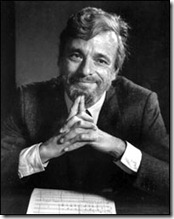 The odd man out in this collection, of course, is Stephen Sondheim. Of course he’s not just a songwriter – far from it – but I was still surprised to find he’d studied under the composer Milton Babbitt whom he describes quite rightly as “the avant-gardist’s avant-gardist.” Not only that but he’d asked Babbitt to teach him atonal music. I loved Babbitt’s response:
The odd man out in this collection, of course, is Stephen Sondheim. Of course he’s not just a songwriter – far from it – but I was still surprised to find he’d studied under the composer Milton Babbitt whom he describes quite rightly as “the avant-gardist’s avant-gardist.” Not only that but he’d asked Babbitt to teach him atonal music. I loved Babbitt’s response:
He said, There’s no point until you’ve exhausted tonal resources for yourself. You haven’t, have you? I said, No, and I suspect I’ll never want to. So I never did study atonal music.
It reminds me so much of Schoenberg’s comment: “There is still plenty of good music to be written in C major.” I think this is something that a lot of writers can relate to as well because there are plenty of avant-garde writers out there and it must be tempting to abandon the humble sentence, to set language free and see where it takes you. The simple fact is when I look at writers like Pinget I have to realise that I don’t think like that so how could I possibly expect to write like that?
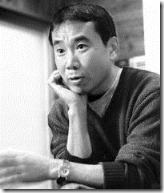 Of all the writers in the book the one I expected to relate to the least was Haruki Murakami. I imagined that the cultural divide would be too wide to bridge. There were things about him that I did relate to. Like me he was also a late starter – he was twenty-nine – and, like me, finding that he was writing a novel “was a surprise” but he “got used to it instantly.” He tells the interviewer: “I just started to write a novel out of the blue. I wanted to write something but I didn’t know how.” Like me he’s also something of a loner. He has no friends who are writers. Unlike me, though, he prefers not to write reviews. He says: “I think my job is to observe people and the world, and not to judge them.”
Of all the writers in the book the one I expected to relate to the least was Haruki Murakami. I imagined that the cultural divide would be too wide to bridge. There were things about him that I did relate to. Like me he was also a late starter – he was twenty-nine – and, like me, finding that he was writing a novel “was a surprise” but he “got used to it instantly.” He tells the interviewer: “I just started to write a novel out of the blue. I wanted to write something but I didn’t know how.” Like me he’s also something of a loner. He has no friends who are writers. Unlike me, though, he prefers not to write reviews. He says: “I think my job is to observe people and the world, and not to judge them.”
Overall this is a solid collection and I don’t think it really matters too much whether you’ve read an author or are even unfamiliar with their work. For those of you who are interested in the creative process every one of these interviews is fascinating. I actually think few people will be able to hold their hands up and say they love every writer listed here but I wouldn’t let that put you off. That said a familiarity with the background to each writer would stand you in good stead. A lot of names are dropped – of individuals, of groups, of magazines – and no one explains who these are, like the reference to Babbitt above, I expect few will have heard of him and only a select few of those will have heard anything by him and a precious few will own anything by him and, yes, that would include me.
At the start I mentioned the quality of the interviews and the main thing you can say about them is that interviewers were chosen who knew their subjects well and could happily reference works and incidents from their subjects’ lives accurately; you never get the impression that they’re pawing though their notes at any point. We also get a detailed note of the setting of the interview, the circumstances and over what period of time it took place: Maya Angelou’s took place, for example, on the stage of the YMHA on Manhattan’s upper East Side in front of a large, predominately female, audience; David Grossman’s took place over four consecutive days; Roth’s had a gap of six months in the middle and what we get to read was heavily edited and revised; there was a similarly long gap in the interview with Auster; Wodehouses’s interview took place over several sessions interrupted only by a break to watch his favourite soap opera:
I understand that you’re going to watch The Edge of Night with me. That’s splendid!
Splendid! Yes, not a word that gets overused these days but a good word to finish this article on. Impossible to cover everything in this book and I wouldn’t even try. I’ve tried to include a bit of everyone but I see a few only get name checks. Suffice to say this is a splendid collection and will keep you entertained for days. And the great thing, of course, is that you can read it in any old order you fancy.
Thursday 14 January 2010
Are you an innie or an outie?

[C]oming out is like high school: some people have good experiences, while others have bad experiences. Everyone learns from it and wants it to end as fast as possible so they can get it over with and graduate to the real world – Rikki Bower
A wee while ago Herman Van Rompuy became the new president of the European Council. It was news for a day. Had it been Tony Blair then that would have been another thing entirely I'm sure although not in my head. Actually Van Rompuy, who's Belgian by the way, was news for a couple of days because the papers jumped on the fact that he wrote haiku which the Financial Times defined as "those impenetrable short Japanese poems that seem to have no real point." Andrew Motion wrote a whole article about the subject in The Guardian. He listed his favourite poem by Van Rompuy as being 'Water':
Puddles wait
for warmth to evaporate.
Water becomes a cloud
although he thought 'Time' a bit clichéd:
Life is sailing
on the sea of time but
only the sea remains
I actually don't mind it. It seems though that his most popular poem (which Motion didn't pick up on) is 'Hair':
Hair blows in the wind
After years there is still wind
Sadly no more hair
I can see why it might be popular although it doesn't do much for me.
This post isn't really about Herman Van Rompuy or politics or haiku. It's not even about journalism, but it was that that got me thinking. The papers of course are out to sensationalise things. They want readers and so they have become increasingly free in their interpretation of the facts. What's interesting in Van Rompuy's case is that the only thing they could dredge up was the fact that the guy writes – and manages to gets published – haiku. He has a website and everything but I have to warn you, Google Translate doesn't do his work any favours.
Plassen wachten
op warmte om te verdampen.
Water wordt een wolk
gets translated as:
Pee waiting
to heat to evaporate.
Water is a cloud.
Oh dear, oh dear, oh dear.
 In the case of the American Democratic presidential contender John Kerry it was kitesurfing the media picked up on. Tony Blair lists no hobbies at all in Who’s Who, although Gordon Brown finds time to play football and tennis apparently. I said this post wasn't going to be about politics and it's not but we clearly find it interesting to know what people do when they're out of whatever particular role they have in our lives. Like mums and dads. It always comes as such a surprise to most kids to learn that there are real people inside their parents. I know it shocked the hell out of me.
In the case of the American Democratic presidential contender John Kerry it was kitesurfing the media picked up on. Tony Blair lists no hobbies at all in Who’s Who, although Gordon Brown finds time to play football and tennis apparently. I said this post wasn't going to be about politics and it's not but we clearly find it interesting to know what people do when they're out of whatever particular role they have in our lives. Like mums and dads. It always comes as such a surprise to most kids to learn that there are real people inside their parents. I know it shocked the hell out of me.
Roles. I think the whole subject is a fascinating subject. Are roles identities? Hmm, must ask my daughter about that. I wrote a poem about it once:
RUSSIAN DOLLS
So many faces
the daughter
the sister
the wife
the mother
the secretary
the friend
the lover
and on the inside
the nothing
19 March, 1997
Carrie used to collect matryoshka dolls – that's where the idea came for that one. She thought it was sexist when she first read it and I suppose it is but it doesn't reflect my personal view of women; it's simply a dissection of one particular woman. The thing is, I could so a similar list for myself:
child
father
son
brother
schoolboy
uncle
friend
lover
husband
And somewhere on the inside . . . the poet. I wonder how many of you would come up with a similar core to your being. The thing is, most of you reading this – and who have been reading my wee articles for some time – will think of me as Jimmy the Poet because that's the face I present to you. It's a lie but I've always been very honest about the fact that I'm a liar. It's a lie in the fact that it's incomplete. It's a lie of omission. A poet is not all I am and for most of my life it's been on the inside and only those few people who got admitted to that . . . what shall we call it? . . . inner sanctum, got to see him.
I didn’t start off like that. For a while 'the poet' was several layers up and easily accessible. I may not have been proud of my poetry (I knew most of it was dire) but I was pleased to be writing it. Over the years though 'the poet' part of me sank almost without trace. All the items on my wee list refer to my relationship to others. I let other people define me with one exception: I could be a poet on my own in fact I had no real clue how to be a poet in company. In time being a poet became my secret identity.
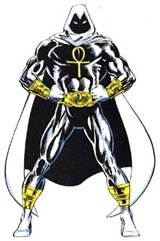 Question: Is Bruce Wayne Batman's secret identity or is it the other way round? Which came first? Is that important? I actually liked Marvel's take on Batman, a character called Moon Knight. What I liked about him is that there were more than two identities on the go here. There was Marc Spector, the man he was born as; Moon Knight, the masked avenger he became when he allowed himself to become the avatar of the Egyptian god Khonshu; after his return to the United States, Spector creates the identity of millionaire entrepreneur Steven Grant, using this identity to purchase a spacious estate, and to remain in contact with the common man he also invents the identity of taxicab driver Jake Lockley. Needless to say in time Spector doesn't know who the hell he is any more and he literally ends up being diagnosed with dissociative identity disorder (that's multiple personalities to you and me).
Question: Is Bruce Wayne Batman's secret identity or is it the other way round? Which came first? Is that important? I actually liked Marvel's take on Batman, a character called Moon Knight. What I liked about him is that there were more than two identities on the go here. There was Marc Spector, the man he was born as; Moon Knight, the masked avenger he became when he allowed himself to become the avatar of the Egyptian god Khonshu; after his return to the United States, Spector creates the identity of millionaire entrepreneur Steven Grant, using this identity to purchase a spacious estate, and to remain in contact with the common man he also invents the identity of taxicab driver Jake Lockley. Needless to say in time Spector doesn't know who the hell he is any more and he literally ends up being diagnosed with dissociative identity disorder (that's multiple personalities to you and me).
Am I a man who sometimes writes or a writer who sometimes pretends he has an ordinary life? Or is it that simple? Most people in my life will see me as the former whereas increasingly I've come to see myself as the latter. Is that pretension or delusion or has The Poet finally taken over completely? Does that sound sick? I don't feel sick.
All superheroes have their enemies and if they can't beat them the very least the bad guys want to do is unmask the hero. And so when people have found out about The Poet the first thing they do is go on the offensive: Have you ever been published? Oh yeah? So where? I've never heard of that? Anyway, what did you get paid? A free copy! Is that all? Well, come on then, let's hear one of your poems. Go on, recite something. What do you mean, you need your notes? You mean you can't just rattle off one right now? Go one, make up a new poem. Here, I hope it rhymes. You know it's not real poetry if it doesn’t rhyme.
I think Herman Van Rompuy got off light in the press. I really do. Could it possibly be that things are changing a bit and that there isn't quite the same stigma attached to being a poet that there used to be? I hope so but somehow I doubt it.
A few years ago Margaret Atwood had this to say:
A lot of being a poet consists of willed ignorance. If you woke up from your trance and realized the nature of the life-threatening and dignity-destroying precipice you were walking along, you would switch into actuarial sciences immediately.
If I had not been ignorant in this particular way, I would not have announced to an assortment of my high school female friends, in the cafeteria one brown-bag lunchtime that I was going to be a writer. I said "writer," not "poet;" I did have some common sense. But my announcement was certainly a conversation-stopper. Sticks of celery were suspended in mid-crunch, peanut-butter sandwiches paused halfway between table and mouth; nobody said a word. One of those present reminded me of this incident recently – I had repressed it – and said she had been simply astounded. "Why?" I said. "Because I wanted to be a writer?" "No," she said. "Because you had the guts to say it out loud." – Waterstone's Poetry Lecture, delivered at Hay on Wye, June 1995
I know the first thing I wanted to do when I put on the mantel of The Poet was to test myself and the toughest thing I could think to pit myself against was the publishing industry. And those first few victories were so sweet. With the existence of the Internet most poets can circumvent that by publishing online, indeed there must be hundreds out there – dare I say thousands? – who have never seen their work in a print magazine or a chapbook and who couldn't care less; they're being read and isn't that the real victory? Surely the printed page is the middle man?
Back in Tudor times things used to be very different:
Today it is usual to ask a young author not 'What has he written?' but 'What has be published?' The achievement of print, with the imprimatur that it implies of a recognised audience of publishers and critics, has become a rough guide to quality and permanence. But the Tudor poet would have been embarrassed, if not insulted, by the question 'What have you published?' It would have seemed to him to introduce a completely irrelevant emphasis upon an unimportant and indeed somewhat discreditable aspect of authorship. The leading Court poets, those who set the pattern of the times, did not write for print.
[…]
The unimportance of the printed-book audience is proved conclusively by the time-lag between composition of most Tudor poetry and its appearance in print. The poet was often dead before his work was printed. – J W Saunders, 'The Stigma of Print: A Note of the Social Bases of Tudor Poetry', Essays in Criticism, p139
 Now I'm sure there are other factors to be taken into account here – the cost of printing and the size of the readership (I mean those who could actually read) – but if we just look at this innocently then it presents us with a different kind of poet. Batman doesn't do what he does to get his name in the papers. It may well end up there but that is not his raison d'être. And shame on him if it was.
Now I'm sure there are other factors to be taken into account here – the cost of printing and the size of the readership (I mean those who could actually read) – but if we just look at this innocently then it presents us with a different kind of poet. Batman doesn't do what he does to get his name in the papers. It may well end up there but that is not his raison d'être. And shame on him if it was.
Which bring us back to our mild-mannered Belgian politician, Herman Van Rompuy. It seems he reads his haiku out at work every now and then. When they're all sitting round the board table he'll chuck in a few lines of poetry just to break up the tedium. He doesn't have an alter ego. Writing poetry is a character trait rather than a separate and distinct personality. So that's why I think outing him was a bit of an anticlimax. I guess that's why they turned Motion on him taking on the role of the school bully. His article ends on this final sentence:
Judging by the poems, Van Rompuy is not only a charming, attentive and sensitive man, but he's clearly in the right job.
That's right, flatter the guy and then stick the boot in. Ah, let's hope that Van Rompuy is not a true poet otherwise his sensitive soul might just be crushed by a remark like that. Somehow I don't think so, politicians come with thick skins.
On the whole I haven't met many people in my life who have felt the need to either attack or dismiss my writing. It's the I-don-get-it attitude that gets me. It would be like Lois saying to Clark: "Yes, I know, sure, I totally get it, you want to fight crime, that's good, that's really good, but could we lose the costume? Seriously. Or at the very least do you think you could start wearing your underpants on the inside? People are starting to talk." I've found that most people don't mind me wanting to write – everyone needs a hobby – but it's when I start to talk about being a writer. They change then. It's as if by saying, "I'm a writer," I'm really saying, "…and I'm better than you. So na na," but that's really not the case. The list of things I can't do is far, far, far longer than the things I can and if they only knew how miserable being a writer can make one I'm quite sure they'd be calling me up and going, "Christ, Jim, I just heard. Are you all right? I mean, we'd hoped it might be just cancer but . . . I mean, a writer! God! How are you coping you poor man?" No wonder Basil Bunting wrote 'What the Chairman Told Tom':
WHAT THE CHAIRMAN TOLD TOM
Poetry? It's a hobby.
I run model trains.
Mr Shaw there breeds pigeons.
It's not work. You don't sweat.
Nobody pays for it.
You could advertise soap.
Art, that's opera; or repertory―
The Desert Song.
Nancy was in the chorus.
But to ask for twelve pounds a week―
married, aren't you?―
you've got a nerve.
How could I look a bus conductor
in the face
if I paid you twelve pounds?
Who says it's poetry, anyhow?
My ten year old
can do it and rhyme.
I get three thousand and expenses,
a car, vouchers,
but I'm an accountant.
They do what I tell them,
my company,
What do you do?
Nasty little words, nasty long words,
it's unhealthy.
I want to wash when I meet a poet.
They're Reds, addicts,
all delinquents.
What you write is rot.
Mr Hines says so, and he's a schoolteacher,
he ought to know.
Go and find work.
If you're interested you can hear Bunting reading the poem here. My contribution to this particular branch of poetic expression is much shorter but no less heartfelt:
COMING OUT
"So you are a
practicing poet?"
she asked,
and I felt unclean
and wanted my closet back.
23 March 1989
Yeah, that's about the size of it. It has a similar flavour to something else Bunting wrote a few years before 'What the Chairman Told Tom':
The Lady asked the Poet:
Why do you wear your raincoat in the drawing-room?
He answered: Not to show
My arse sticking out of my trousers.From First Book of Odes – XII (1929)
Coming out as a poet is one thing. In the grand scheme of things it wasn't so hard. Becoming comfortable being a poet is another thing entirely. It's taken me a very long time I can tell you.
So, I know I've meandered a bit with this post and I also know I'm preaching to the choir but every now and then we all need to let off a bit of steam so please feel free to contribute your own tales of coming to terms with your inner scribbler.

